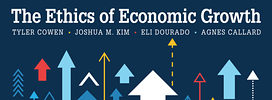Virtually all human societies have used inconsistent valuations of life across different endeavors and contexts, and contemporary American society does so too. One reason for this is that life valuations perform an allocative function (where to spend money and how much?) and also an “advertising function,” reflecting social values about human dignity. The ideal society I outline in Stubborn Attachments probably would lower the discrepancy between these two approaches to valuing lives, but I doubt if that society could eliminate it. So the socially validated figures for life valuation likely would still stand above what might otherwise be an optimal level. Think of this as PR for the society as a whole.
Why love Vermeer? Stubborn Attachments stresses that a lot of other choices, including aesthetics, lie within paths of equal expected economic growth. They can be addressed by critics, art historians, and perhaps even philosophers of aesthetics. Besides, is it perhaps possible that Vermeer boosts economic growth in Delft to this day?

